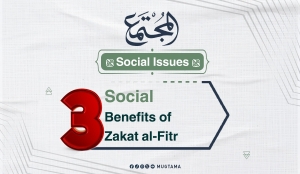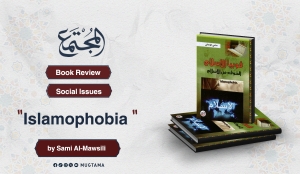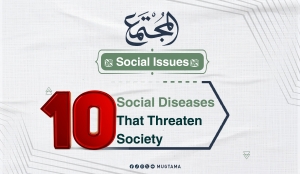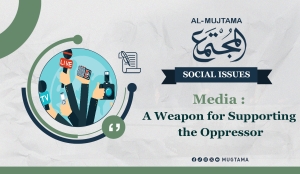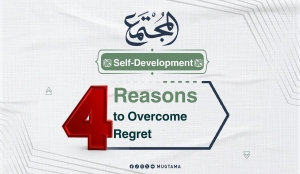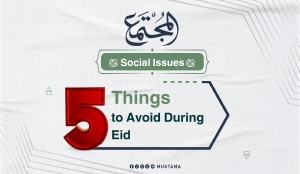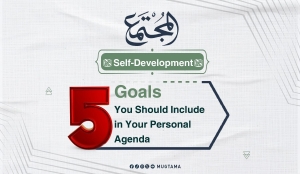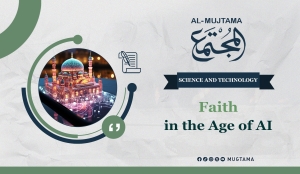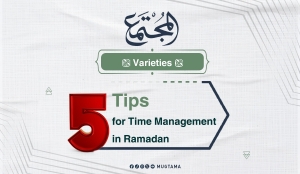Hadeel
3 Social Benefits of Zakat al-Fitr
April 02, 2025
Abu Dawood and Ibn Majah narrated, with an authentic chain, from Abdullah ibn Abbas, who said: "The Messenger of Allah ﷺ enjoined Zakat al-Fitr on the one who fasts (i.e. fasted during the month of Ramadan) to purify him from any indecent act or speech and for the purpose of providing food for the needy. It is accepted as Zakah for the person who pays it before the Eid prayer and it is Sadaqah (i.e. voluntary charity) for the person who pays it after the Eid prayer."
This hadith draws our attention to the social aspect of Zakat al-Fitr through the phrase: "as food for the needy." It serves as an example of the Islamic system of solidarity. The social benefits of Zakat al-Fitr can be understood through the following points:
1. Easing the Burden on the Needy and Fulfilling Their Needs
Zakat al-Fitr comes at the conclusion of Ramadan and the arrival of Eid al-Fitr. When Eid comes, people rejoice by eating the best food, drinking the finest drinks, and wearing their best clothes. However, the poor often find themselves unable to provide for themselves and their families in terms of food, drink, and clothing. Here, Zakat al-Fitr plays a crucial role in easing their hardships, alleviating their distress, comforting their broken hearts, and shielding them from the shame of poverty.
It is an effective means of protecting the poor from the humiliation of financial hardship, especially for the head of the household, who may feel helpless before his wife and children while others around him enjoy the blessings of Eid.
What is remarkable about Zakat al-Fitr is that it is required to be given from the staple food of the people of the land (1). This ensures that the poor partake in the same food and drink as those in their society, preventing feelings of inferiority or deprivation. One of its key objectives is to spare the poor from humiliation on the day of Eid, as they receive the zakah beforehand, allowing them to meet their needs.
The Islamic emphasis on easing difficulties and fulfilling the needs of the poor is also evident in the discussion among scholars regarding its form—whether it should be given as food or its monetary equivalent. The Maliki, Shafi'i, and Hanbali schools of thought upheld that it must be given in the form of staple food, based on the hadith of Abu Sa'id al-Khudri, who said: "We used to give Zakat al-Fitr as one sa' (a specific measurement) of grain, or one sa' of barley or one sa' of dates, or one sa' of cheese or one sa' of raisins." (Bukhari & Muslim)
However, Imam Abu Hanifa allowed giving the equivalent value in money, considering the needs of the poor (2). This opinion was also supported by scholars such as Hasan al-Basri, Sufyan al-Thawri, and Caliph Umar ibn Abdul Aziz (3). Furthermore, Imam Ibn Taymiyyah emphasized that priority should be given to the best interest of the poor and their specific needs (4).
This scholarly diversity ultimately benefits society, as those who give Zakat al-Fitr in the form of food help meet the dietary needs of the poor, while those who give it as money allow them to meet other essential expenses.
2. Bringing Joy to the Poor and Spreading Happiness in Society
Eid is a day of joy for everyone, and no one should be excluded from its happiness due to poverty or financial hardship. Zakat al-Fitr plays a vital role in bringing joy to the hearts of the needy and putting smiles on their faces on the day of Eid.
The timing of its payment is particularly significant. Scholars unanimously agree that it should be given before the Eid prayer so that the poor are not preoccupied with securing their food and drink, thus ensuring they do not have to beg or feel humiliated. These objectives align with Islam’s emphasis on fostering happiness and dignity.
Maliki and Hanbali scholars even permitted giving it one or two days before Eid (5), while some jurists allowed it to be given as early as the middle of Ramadan (6). Their reasoning was to ensure the poor had sufficient time to prepare for the festivities.
To reinforce this spirit of joy and solidarity, Islam has legislated two significant acts of charity during the two Eids: Zakat al-Fitr during Eid al-Fitr and the ritual sacrifice (Udhiyah) during Eid al-Adha. Both of these acts emphasize the importance of including the poor in communal celebrations, allowing them to partake in the blessings of these occasions. In this way, both the giver and the recipient experience happiness—one through the joy of giving and the other through the joy of being provided for.
3. Strengthening Social Bonds
Zakat al-Fitr is a form of social solidarity, particularly during important occasions like Eid, which often entails additional financial burdens. Unlike other forms of zakah that require the giver to possess a certain amount of wealth, Zakat al-Fitr is required from anyone who possesses enough food for a day (7). Scholars base this ruling on the hadith narrated by Sahl ibn al-Hanzaliyyah, in which the Prophet ﷺ said: "He who begs when he has a sufficiency is simply asking for a great amount of hell." When asked what "suffices" meant, he replied: "Having enough food for a day and a night." (8)
The reasoning behind imposing Zakat al-Fitr on anyone with a day's sustenance is to cultivate a spirit of generosity and expand the culture of giving. This encourages all members of society to contribute according to their means, reinforcing mutual support and care.
Additionally, when the poor witness such acts of kindness and concern from others, their hearts are filled with gratitude rather than resentment. This prevents social unrest and eliminates the need for theft or other desperate measures. The result is a cohesive and well-integrated society in which the bonds between its members are strengthened, creating a community based on love, care, and mutual assistance.
-------------------------------------------------------------
(1) Al-Majmu' by Al-Nawawi (6/130).
(2) The Kuwaiti Fiqh Encyclopedia (23/343).
(3) Ramadan and the Fiqh of Fasting and Qiyam by Dr. Yusuf Al-Qaradawi, p. 224.
(4) Majmu' al-Fatawa by Ibn Taymiyyah (1/299).
(5) The Kuwaiti Fiqh Encyclopedia (23/341).
(6) Al-Mughni by Ibn Qudamah (4/300).
(7) The Kuwaiti Fiqh Encyclopedia (23/337).
(8) Narrated by Abu Dawood (1629) and Ahmad (17625).
Book Review: “Islamophobia” by Sami Al-Mawsili
March 30, 2025Pathological Fear of Islam and Its Political Dimensions
The book Islamophobia by Sami Al-Mawsili is an in-depth study that examines the growing Western fear of Islam, which has evolved from mere individual sentiments into an institutionalized policy reflected in decisions and strategic directions adopted by Western countries. The author discusses the various dimensions of this phenomenon, shedding light on its historical, political, and social roots while reviewing the perspectives of Orientalists and Western intellectuals who sought to counter the global spread of Islam.
The Historical and Political Roots of Islamophobia
Al-Mawsili asserts that the pathological fear of Islam is not just a fleeting emotional reaction but a deliberate strategy aimed at halting the expansion of Islam and undermining its civilizational influence on the global stage. The author cites documents and statements that reveal how the West perceives Islam as a civilizational threat—not only from a doctrinal perspective but also as a social and political force capable of shifting the global balance of power. He references the European Conference of 1907, where it was declared that Muslim unity posed the greatest threat to Western civilization. This conclusion led to the recommendation of creating a hostile entity in the Middle East, which later materialized in the establishment of the Zionist state.
Islam as an Influential Global Force
The book analyzes the West’s deep awareness of Islam’s growing power, not only due to the increasing number of its adherents but also because of its ability to shape societies and build civilizations. Al-Mawsili quotes Western thinkers who have acknowledged that Islam possesses a unique motivational energy that enables its rapid spread. They argue that if Islam were given the opportunity to exist in a politically free environment, it would reclaim its intellectual and civilizational dominance.
The Intellectual War Against Islam
The author details how Western powers have sought to weaken Islam from within by distorting its teachings and reinterpreting its texts to align with their own agendas. The book explores the recommendations of Orientalists and missionaries who attempted to use the Quran itself as a weapon against Muslims by manipulating its meanings and promoting the idea that what is new in it is not true, and what is true is not new. It also discusses the role of Westernization in education, efforts to impose the Western model in schools, and the targeting of Muslim women by immersing them in calls for false "liberation" and moral decay.
Political Manipulation and the Fueling of Divisions
Al-Mawsili highlights how dictatorial regimes in the Muslim world are employed as Western tools to thwart any genuine Islamic revival. He cites American thinker W.C. Smith, who stated: "If Muslims were granted freedom in their own countries, Islam would triumph. Therefore, Western interests can only be preserved through authoritarian regimes." The book explains how Western support for oppressive governments is part of a broader strategy aimed at keeping Muslims away from good governance based on Islamic principles.
The Future of Islam Amid These Policies
The author concludes his book with an in-depth analysis of Islam’s future in light of these ongoing challenges, affirming that despite all Western efforts, they have failed to stop the spread of Islam. On the contrary, Islam continues to grow even within Western countries. He further points out that what the West fears most is not Islam itself, but rather the emergence of strong Islamic leadership capable of uniting Muslims and restoring their civilizational role on the international stage.
10 Social Diseases That Threaten Society
March 30, 2025Since the dawn of humanity, societies have undergone cycles of progress and decline. Between righteousness and deviation, purity and corruption, social phenomena emerge, carrying within them the seeds of disintegration and weakness. These are called social diseases, which deeply strike at the fabric of society, threatening its stability and harmony. Just as disease weakens the body, these social ills undermine the spirit of the nation, spreading chaos, weakening cohesion, and paving the way for behaviors that erode morals and dismantle civilization.
Major Social Diseases
1. Addiction: The Intoxication of Minds and the Loss of Generations
When a person falls into the abyss of drugs, alcohol, or gambling, they do not merely lose their wealth and health but also their soul and willpower. They shift from being productive members of society to burdens upon themselves, their families, and their communities.
Allah says: "O you who have believed, indeed, intoxicants, gambling, [sacrificing on] stone alters [to other than Allah], and divining arrows are but defilement from the work of Satan, so avoid it that you may be successful." (Al-Ma'idah: 90)
2. Crime and Violence: When Fear Becomes a Street Companion
The spread of theft, murder, and all forms of violence strips people of their sense of security, fostering an atmosphere of fear and breaking the bonds of trust within society. This weakens stability and amplifies chaos.
The Prophet ﷺ said: "Every Muslim’s blood, wealth, and honor are sacred to another Muslim." (Sahih Muslim 2564)
3. Corruption and Bribery: An Attack on Rights and Justice
When administrative corruption and bribery infiltrate institutions, moral values are thrown to the wind. The competent are deprived of their rights, justice crumbles, and the economy is shaken.
Allah says: "And do not consume one another’s wealth unjustly or send it [in bribery] to the rulers in order that [they might aid] you [to] consume a portion of the wealth of the people in sin, while you know [it is unlawful]." (Al-Baqarah: 188)
4. Family Disintegration: A Crack in Society’s Foundation
The family is the cornerstone of society. When it is shaken by divorce, emotional neglect, or the absence of role models, children grow up burdened with psychological wounds, making them vulnerable to deviation and loss.
Allah says: "O you who have believed, protect yourselves and your families from a Fire whose fuel is people and stones." (At-Tahrim: 6)
5. Begging and Homelessness: Faces of Social Oppression
When social justice is absent and poverty becomes overwhelming, begging and homelessness become visible signs of societal suffering. This widens the gap between social classes and weakens the sense of solidarity.
The Prophet ﷺ said: "It is better for one of you to take a bundle of firewood and carry it on his back than to ask someone who may give him or refuse." (Sahih al-Bukhari 1402)
6. Weak Religious and Moral Conscience: When Conscience Fades
When people lose their connection to religious principles and values, deception, greed, and selfishness dominate interactions.
Allah says: "Indeed, Allah commands justice, good conduct, and giving to relatives and forbids immorality, bad conduct, and oppression. He admonishes you that perhaps you will be reminded." (An-Nahl: 90)
7. Unemployment and Poverty: The Root of Social Evils
The lack of job opportunities and widespread poverty drive youth to despair, making them susceptible to crime and addiction, thus adding to society’s burdens instead of strengthening it.
The Prophet ﷺ said: "If you were to rely upon Allah with the reliance He is due, you would be given provision as the birds are: they go forth hungry in the morning and return with full stomachs in the evening." (Sunan At-Tirmidhi 2344, authenticated by Al-Albani)
8. Misleading Media and Mind Manipulation
In an age of information overflow, deceptive media and shallow content become dangerous tools that distort public awareness, fuel conflicts, and spread a culture of ignorance and moral decay.
Allah says: "O you who have believed, if there comes to you a disobedient one with information, investigate, lest you harm a people out of ignorance and become, over what you have done, regretful." (Al-Hujurat: 6)
9. Intellectual Extremism: A Path to Division and Conflict
Whether religious or ideological, extremism breeds rigid mindsets that reject dialogue and promote exclusion, leading to disturbances and divisions that threaten societal unity.
Allah says: "And thus We have made you a just community." (Al-Baqarah: 143)
10. Class Disparity and Injustice: Fuel for Social Unrest
When the poor feel deprived of basic rights while the wealthy waste resources, frustration and anger grow, potentially leading to serious social unrest.
The Prophet ﷺ said: "He is not one of us who sleeps while his neighbor is hungry, knowing about it." (Al-Mu'jam Al-Awsat by At-Tabarani 7699, authenticated by Al-Albani)
Restoring Society’s Well-being
Addressing these social diseases requires a collective effort from governments, communities, and individuals. True reform begins with instilling ethical values and strengthening religious and educational foundations from childhood, ensuring that individuals grow up with principles that protect them from deviation.
Combating poverty and unemployment through job creation and ensuring social justice reduces crime and homelessness. Media institutions must take responsibility for spreading awareness and combating misinformation and intellectual corruption.
Families remain the first line of defense. A stable household that nurtures and guides its children fosters resilience against destructive behaviors. Additionally, strict laws must deter corruption and crime, while rehabilitation centers must support those who have faltered, reintegrating them into society as productive individuals.
When these efforts come together, society regains its strength, standing firm in the face of challenges with determination and unity.
Media: A Weapon for Supporting the Oppressor
March 29, 2025When Justice Becomes Strange
There were times when supporting the oppressed was an honor that men competed to uphold, and standing against injustice was the true measure of manhood and faith. But today, the scales have been overturned—supporting the oppressed has become rare, while betrayal has become the norm. The oppressed are met with denial and neglect, while the oppressor finds those who aid him in his tyranny, even beautifying his path of oppression.
Today, standing for justice has become an exception rather than the rule. Those who call for it are seen as rebels against the status quo, as if they are asking for the impossible in a world ruled by interests and gains. Silence in the face of injustice is treated as a virtue—or even a necessity to avoid losses!
Justifying Oppression
In an era where the media is the primary force shaping public opinion, truth is no longer a fixed criterion. Instead, it is subject to interests and political agendas. The voice of the oppressed is only amplified when it serves a particular agenda, and it is silenced when it exposes the complicity of the powerful or the double standards at play. Thus, oppression, which was once abhorred, is now marketed through deceptive means. This is why we are in dire need of reviving the concept of supporting the oppressed as a duty that does not expire with time nor submit to temporary interests.
However, the greatest dilemma is not just in cowardice but in justification. The oppressor is turned into a victim, while the oppressed is portrayed as the aggressor—all under the influence of a manipulated media that reshapes events and presents them with a different narrative that serves its interests.
The media is no longer just a messenger of events; it has become their creator, directing public opinion according to its own agenda. Supporting the oppressed is not just empty words spoken in gatherings, nor slogans raised without impact. It is an action that must be translated into real stances. But how can this be achieved when the media crafts narratives as it pleases—turning the oppressor into a victim and the victim into an aggressor—convincing the masses that justice is served when voices of truth are silenced?
The Messenger of Allah ﷺ said: "No (Muslim) man will desert a man who is a Muslim in a place where his respect may be violated and his honour aspersed without Allah deserting him in a place here he wishes his help; and no (Muslim) man who will help a Muslim in a place where his honour may be aspersed and his respect violated without Allah helping him in a place where he wishes his help." (Narrated by Ahmad and graded good by Al-Albani). How much oppression takes place in broad daylight without being condemned—rather, it is justified and even beautified!
One of the clearest examples of this media manipulation is the Western media’s coverage of the war on Gaza. Palestinian victims are reduced to mere numbers, while the Zionist narrative is propagated to justify mass bombings and killings as "self-defense." Meanwhile, the massacres against innocent civilians are covered up, and anyone who defends Palestinians is demonized and labeled as anti-Semitic.
On the other hand, there is a widespread media push to normalize homosexuality within Islamic societies. Major media platforms work to portray homosexuals as heroes, promoting them in TV series, films, and even commercials, portraying this deviation as a natural part of life—completely disregarding Islamic values and teachings. Moreover, anyone who opposes this agenda is vilified as an "extremist" or "homophobic."
Supporting the Oppressed Is a Duty, Not an Option
Supporting the oppressed has never been a choice for one to hesitate over; rather, it is a duty imposed by faith and morals—a scale by which the nation’s adherence to justice and mercy is measured. The Messenger of Allah ﷺ said: "A Muslim is a Muslim’s brother: he does not wrong him or abandon him. If anyone cares for his brother’s need, Allah will care for his need ; if anyone removes a Muslim’s anxiety, Allah will remove from him, on account of it, one of the anxieties of the Day of resurrection ; and if anyone conceals a Muslim’s fault, Allah will conceal his fault on the Day of resurrection." (Narrated by Al-Bukhari)
If you are among those who ask, "How can we bring about victory?" then start with yourself—support the oppressed wherever you can, and speak the truth even if it is bitter. Honor lies in upholding the truth, even if people abandon you. As the Prophet ﷺ said: "Whoever supports his brother in secret, Allah will support him in this world and the Hereafter." (Sahih Al-Jami’ 6574)
-------------------------------------------------------------
Resources:
- Mahasin AlIslam Encyclopedia
- Al-Mujtama Magazine
- Alukah
- Islamweb
4 Reasons to Overcome Regret
March 29, 2025If you have wasted a lot of time and wish that time could take you back again…
If you regret many things that happened, words that were spoken, opportunities that were wasted, and dreams that were destroyed…
I regret to tell you that you are still crying over spilled milk.
In an English school, a teacher wanted to teach his students a lesson about the danger of excessive regret. He brought a glass cup, filled it with milk, and then broke the cup, causing the milk to spill onto the ground. He then asked the students to collect the spilled milk, but they did not even attempt to do so, as it was obvious that the milk could not be returned to the cup. When they realized their inability to restore the cup and milk as they were, the teacher told them, “My dear, do not cry over spilled milk.”
Do not cry over the past and lose both the present and the future. Do not keep looking back, for you will inevitably fall face-first at the first obstacle. Do not stand before the clock, pleading with its hands to turn backward!
Regret is of two types:
Desirable regret and forbidden regret. The first type of remorse is admirable in its purpose, noble in its goal and origin. Regarding this, the Prophet ﷺ said in a hadith narrated by Ibn Mas'ud, “The believer sees in his sins as though he were sitting under a mountain which he fears may fall on him, but the profligate sees his sins like a fly which has passed over his nose and which he has brushed away with his hand.” (Sahih al-Bukhari)
This type of regret is necessary because it motivates action. As for the forbidden type of regret, it is when a person reproaches himself over missed worldly gains and desires. This type is prohibited because it destroys the soul and hinders action. Ibn Abbas, may Allah be pleased with him, said, “There is no one who does not feel sadness, but the prohibited joy and sorrow are those that lead to what is not permissible.”
Four Reasons to Stop Forbidden Regret
1. Regret is a Sign of Discontent with Allah’s Decree
Allah says: “No disaster strikes upon the earth or among yourselves except that it is in a register before We bring it into being—indeed that, for Allah, is easy. In order that you not despair over what has eluded you and not exult [in pride] over what He has given you. And Allah does not like everyone self-deluded and boastful.” (Al-Hadid: 22-23)
When Abu Al-Su’ood interpreted these verses, he said: We have informed you of this so that you do not grieve over the worldly blessings and adornments you missed, nor rejoice excessively over what Allah has given you. For whoever knows that everything is predestined, he understands that what is meant to pass will pass, and what is meant to come will come. Thus, he neither excessively grieves over what is lost nor exults over what is gained. The believer does not regret the past; if it was good, then that is great, and if not, then it is a lesson.
2. You Cannot Change the Past, But You Can Shape the Future
The words you regret saying, the people who hurt you, and the past that shackles you with ropes of remorse—all of these are beyond your control because they have already happened and become part of history. So, will you deepen your wounds with the daggers of the past, or will you heal them with the opportunities of the future?
Today, you can choose your words carefully, think before you act, deliberate over your decisions, and select what suits you. Instead of self-reproach, you can turn the lessons you learned into real-life applications that make you content with yourself.
Abu Huraira reported that the Messenger of Allah ﷺ said: “A believer who is strong (and healthy) is better and dearer to Allah than the weak believer, but there is goodness in both of them. Be keen on what benefits you and seek help from Allah, and do not give up. If anything afflicts you do not say, ‘If I had done such and such things, such and such would have happened.’ But say, ‘Allah decrees and what He wills He does,’ for (the utterance) ‘If I had’ provides an opening for the deeds of the devil.” (Muslim)
In explaining this hadith, Sheikh Abdul Rahman Al-Sa’di said: Saying ‘if only’ in such cases opens the door to Satan's work, as it weakens belief in divine decree, makes a person object to it, and leads him into sorrow and distress. Thus, the Prophet ﷺ instructed us to focus on beneficial matters that we can attain rather than dwelling on what has passed and is beyond our control, seeking Allah's help in these matters, and accepting what we have missed.
3. Forbidden Regret is the Fastest Way to Self-Destruction
Regret and guilt are emotional states often triggered by violating one’s conscience, values, and beliefs.
Excessive regret turns into a dangerous disease that eats away at a person, dragging them into a psychological battle they cannot withstand—a battle that can lead to a loss of control, causing severe problems such as anxiety, stress, and depression.
Approximately 280 million people worldwide suffer from depression, and it is 50% more common among women than men. One of the key causes of depression is excessive regret and the inability to move past it.
This is why the Prophet ﷺ used to make this supplication: "O Allah, I seek refuge in You from worry and sorrow, from weakness and laziness, from miserliness and cowardice."
So, understand that if you regret the past and fear the future, you will have no time left to live in the present.
4. Being Unique and Different from Others
In his book The Power of Regret, author Daniel Pink conducted a Global Regret Survey, and the biggest revelation was that all countries in the world experience regret at nearly the same rates.
He asked people a question without explicitly using the word “regret”: “How often do you look back at your life and wish you had done something differently?”
The results showed that 83% of the world’s population experiences regret!
If such a large percentage of people suffer from regret, then why not be different?
Why not use your regret as an opportunity to fuel your progress instead of dragging yourself down?
Why keep looking back when you still have countless opportunities ahead?
Isn't it time to be unique and set yourself apart from the rest?
Close the windows of regret before they shut the doors of happiness and joy. Free yourself from the chains that have weighed you down, and take a new step forward—a step filled with inner peace and free from self-reproach.
We conclude with the words of Ibn Al-Qayyim: Before regret overtakes you... redeem yourself today, for the market is open, the price is affordable, and the goods are plentiful. A day will come when neither little nor much will be available… “That is the Day of Deprivation” ... “And the Day the wrongdoer will bite on his hands [in regret]”.
-------------------------------------------------------------
5 Things to Avoid During Eid
March 29, 2025With the approach of Eid al-Fitr, filled with joy and happiness, Muslims continue their preparations to celebrate this occasion after a month of fasting, night prayers, seclusion, charity, and good deeds, asking Allah for acceptance, forgiveness, and emancipation from Hellfire.
Some people rejoice on this day by breaking their fast and enjoying the lawful blessings, while continuing their acts of worship by maintaining family ties, visiting relatives, checking on neighbors, and bringing happiness to fellow Muslims. However, others mistakenly believe that Eid is a day of unrestricted amusement, indulging in the forbidden under the pretext of joy and making up for what they abstained from in Ramadan.
Yet, a wise Muslim knows that the acceptance of their fasting and prayers lies in continuing their obedience to Allah. Their joy should align with Allah’s laws and the Sunnah of His Prophet ﷺ, realizing that Eid is not for sinning but for enjoying what is permissible.
These lines summarize five matters that some people fall into, which every Muslim should avoid to prevent committing sins, wrongdoing, or innovation.
1. Fasting on Eid is Forbidden
It is prohibited to fast on Eid, as stated in the authentic collections of Al-Bukhari and Muslim, where Abu Sa’id reported that The Prophet ﷺ forbade to observe fast on two days the day of Fitr and the day of Sacrifice ('Id-ul-Adha). Scholars explain that the reason for the prohibition is to mark the end of Ramadan distinctly by eating after it, while Eid al-Adha is linked to the sacrificial ritual, which involves eating from the slaughtered animal. If fasting were allowed, the meaning of the sacrifice would be lost.
However, a Muslim may fast on the second day of Eid and choose any days to fast the six days of Shawwal, whether consecutively or separately, as the Prophet ﷺ said: “If anyone fasts during Ramadan, then follows it with six days in Shawwal, it will be like a perpetual fast.” (Narrated by Muslim)
2. Disliked Practice of Visiting Graves on Eid
Visiting graves on Eid is discouraged, as it brings sadness on a day that Allah has designated for joy and celebration. Instead, it is better to visit the living and exchange Eid greetings. Some people have the custom of distributing food in cemeteries on Eid, which has no basis in Islamic teachings. Sheikh Ibn Baz stated that specifying Eid, Friday, or any particular day for visiting graves is not established in Islam. Rather, visiting graves should be done periodically as circumstances permit, in line with the Prophet’s ﷺ instruction: “Visit the graves, for they remind you of the Hereafter.”
3. Women Going Out in Adornment in Front of Non-Mahram Men
One common issue on Eid is women going out wearing makeup and revealing clothing as if Eid were an occasion for beautification and exposure. It is forbidden to wear transparent or tight-fitting clothes that reveal the body, or to apply perfume when going out. However, this does not mean that women should not attend the Eid prayer; in fact, it is recommended for them to do so. Even menstruating women are encouraged to go out and witness the gathering, provided they do not enter the prayer area. The important condition is that they go out modestly dressed and without perfume, as Allah says: "And abide in your homes and do not display yourselves as [was] the display of the former times of ignorance." (Al-Ahzab: 33)
4. The Prohibition of Fireworks and Firecrackers
Using fireworks and firecrackers (known as tartaan in some regions) on Eid or any other time is harmful and wasteful. These cause harm, waste money, and disturb others. The Prophet ﷺ said: “It is not lawful for a Muslim to frighten another Muslim.” (Narrated by Abu Dawood and Ahmad)
Firecrackers can also lead to serious accidents, such as fires or injuries to bystanders. The Prophet ﷺ warned: “There should be neither harming nor reciprocating harm.” Additionally, spending money on such things falls under extravagance, which is prohibited in Islam, as Allah says: "O children of Adam, take your adornment at every masjid, and eat and drink, but do not be excessive. Indeed, He does not like those who commit excess." (Al-A'raf: 31)
5. Indulgence in Sinful Activities
Many people, especially the youth, are deceived by Satan into thinking that Eid is a time for unrestrained entertainment, mixing between genders, and staying up late in inappropriate gatherings. This can lead to serious sins such as drinking alcohol, taking drugs, watching immoral content, harassing women, and engaging in other prohibited acts. The true joy of Eid should come from lawful pleasures, gratitude for completing Ramadan, and continuing acts of obedience.
A Muslim should celebrate in ways that are permissible, avoiding anything that displeases Allah, so that their Eid remains a source of blessing rather than regret.
-------------------------------------------------------------
5 Goals You Should Include in Your Personal Agenda
March 26, 2025Amid the hustle of life’s challenges and financial pressures, many people may lose their sense of direction without setting a roadmap for a year that passes from their lives—one that may stand as a witness for or against them, a year of either success or loss in both their worldly and afterlife affairs.
The Most Emphasized Stage of Life
It is well known that a person will be questioned about how they spent their life, yet they will receive a separate question specifically about their youth. This is because youth is the most emphasized stage of life for which a person will be held accountable on the Day of Judgment, regardless of whether they die young or old.
Abu Barzah Al-Aslami reported that the Messenger of Allah (ﷺ) said: "The feet of the slave of Allah shall not move [on the Day of Judgement] until he is asked about five things: about his life and what he did with it, about his knowledge and what he did with it, about his wealth and how he earned it and where he spent it on, about his body and for what did he wear it out." (Reported by At-Tirmidhi)
Annual Goals List
It is wise for a person to set a list of goals they wish to achieve each year. These should be diverse, covering spiritual, physical, professional, and social aspirations, along with other ambitions that preoccupy people in today's world.
The Prophet (ﷺ) advised a man by saying: " Take advantage of five before five: your youth before your old age, your health before your illness, your riches before your poverty, your free time before your work, and your life before your death." (Sahih Al-Jami’)
The following lines offer a roadmap consisting of five key items that should be at the top of every individual's personal agenda as part of their self-development plans. Let their motto be as Al-Hasan Al-Basri said: "Every day that dawns calls out: O son of Adam, I am a new day and a witness to your deeds, so take advantage of me, for I will never return until the Day of Judgment."
1. A Spiritual Goal
Begin with a spiritual and faith-based goal—strengthening your connection with Allah by maintaining prayers and dhikr (remembrance of Allah), dedicating time for night prayers, fasting voluntary days, memorizing the Qur’an, or aiming to perform Umrah or Hajj this year. The key is to ensure you attain a substantial share of worship that brings you closer to Allah, making you truly successful in both this life and the Hereafter.
2. A Social Goal
A social goal involves increasing visits to relatives, maintaining family ties, checking on loved ones, putting an end to disputes and enmities with neighbors and everyone, and strengthening social relationships. This aligns with Allah’s command: "And give the relative his right." (Al-Isra: 26), and again for emphasis: "So give the relative his right." (Ar-Rum: 38), Allah also commands: "Worship Allah and associate nothing with Him, and to parents do good, and to relatives." (An-Nisa: 36)
3. A Career Goal
A professional goal should focus on developing your skills and capabilities, obtaining specialized training, and excelling in your job. Striving for career advancement through diligence and dedication not only benefits your workplace but also presents you as a role model for others, including non-Muslims. This is in line with the hadith: " Allah loves that when one of you does something, that they perfect it." (Authenticated by Al-Albani)
4. A Short-Term Goal
Short-term goals provide immediate achievements that boost morale and energy, helping to sustain motivation for long-term objectives. Long-term goals may sometimes feel overwhelming or discouraging, so breaking them down into smaller, quarterly goals or weekly and monthly targets—such as reading a book or losing four kilograms in a month—can make them more manageable and achievable according to your time and energy.
A scientific study indicates that over 40% of people who enthusiastically write down New Year’s resolutions abandon them after the first month due to frustration, poor time management, lack of prioritization, or setting unrealistic goals that exceed their capabilities.
5. A Volunteer Goal
A volunteer goal should involve engaging in charitable or community service activities, such as sponsoring orphans, helping the sick, planting trees in your neighborhood, or supporting relief efforts for those in Gaza and Syria. Contributing to humanitarian causes through official channels is a meaningful way to ensure your year includes acts of goodness.
“My success is only through Allah”
In conclusion, prepare your goals list, but do not overwhelm yourself with too many. Prioritize, categorize, and create a schedule. Let it encompass your spiritual, social and psychological life. Stay committed, reward yourself for accomplishments, and regularly assess your progress. Let your guiding principle be: "My success is only through Allah."
-------------------------------------------------------------
AI Role in the Rise of Digital Religiosity
March 25, 2025Artificial intelligence is one of the most important and latest weapons used by most countries around the world. Some have mastered its use and benefited from its advantages, while others have misused it, falling into its traps, drinking its poison, losing their religion, and being led astray by deceptive slogans and the false allure of AI tools. They quickly became victims of these tools instead of harnessing them for the service of their society, religion, and country. According to the "AI Index Report 2024," the impact of artificial intelligence on societies is increasing at an unprecedented rate, with several institutions predicting that this sector will contribute approximately $320 billion to the GDP of Middle Eastern countries by 2030.
Artificial intelligence is a technology that enables computers to analyze data and interact with people in a way that mimics human intelligence, making it an effective tool for spreading knowledge and learning. It is well known that Islam always encourages scientific research, technological advancement, and their use for the public good, as long as they do not contradict Islamic values and principles. Islam has elevated the status of knowledge and scholars, as Allah says in His Book: "Allah will raise those who have believed among you and those who were given knowledge, by degrees. And Allah is acquainted with what you do." (Al-Mujadila: 11)
The Prophet ﷺ also urged us to seek knowledge and teach it to others, as long as it is beneficial. He said: "God, His angels, the inhabitants of the heavens and the earth, even the ant in its hole and even the fish invoke blessings on him who teaches men what is good."
Based on this, artificial intelligence, with its various tools, has become an innovative means to contribute to introducing Islam, its religious and moral values, by providing accurate information, offering religious rulings and fatwas, and translating Islamic texts in a simplified, easy, and quick manner. This has led to the emergence of the term "digital religiosity." Despite the importance of this concept, questions remain about the accuracy of AI tools in presenting Islamic content and the challenges that may arise when using them to serve religion. This, in turn, necessitates the involvement of religious scholars and specialists to oversee the content being presented.
From the above, it is clear that studying the relationship between artificial intelligence and Islam, and the resulting concept of digital religiosity, is a highly significant topic worthy of research and discussion. This would help maximize the benefits of these tools and harness them for the service of Islam, the dissemination of Islamic teachings, and the preservation of religious and moral guidelines, which we will delve into further in the following sections, Allah willing.
The Concept of Artificial Intelligence (AI)
Artificial intelligence is a branch of computer science that aims to create systems capable of simulating human intelligence and performing related tasks that typically require human intelligence, such as learning, decision-making, reasoning, and interacting with the environment. AI relies on a variety of technologies, including machine learning, natural language processing (NLP), deep learning, and computer vision.
AI comes in different types:
- Narrow AI, which is designed for specific tasks such as translation, image recognition, and voice assistants.
- General AI, which has cognitive abilities similar to humans and can learn and adapt across different fields.
- Super AI, which surpasses human intelligence.
Given its importance, the International Monetary Fund reports that AI could impact around 40% of global jobs, replacing some and complementing others.
The Concept of "Digital Religiosity"
Digital religiosity is a modern concept that refers to the use of digital technology (the internet, smart applications, social media) to serve religion, enhance religiosity, and spread Islamic values. With over 2.04 billion Muslims, making up more than 25% of the world's population, digital religiosity includes religious activities carried out through digital means, such as:
- Access to religious content: Listening to the Quran, Islamic lectures, articles, and fatwas online.
- Religious interaction via social media: Sharing Quranic verses, hadiths, and engaging with scholars through digital platforms.
- Islamic applications: Apps for prayer times, digital Qurans, AI-based religious Q&A programs, and smart fatwa services.
- Electronic worship activities: Attending remote learning sessions, participating in religious awareness campaigns, and donating to charities through digital platforms.
It becomes clear that the concept of religious commitment is of great importance, as it facilitates access to religious knowledge for anyone, at any time, and in any place. It bridges the gap between religious scholars and the public through modern digital communication tools, helping to spread the teachings of Islam in innovative and engaging ways for different generations. Additionally, it provides numerous reliable sources for fatwas and Islamic information that both Muslims—and others—need across the world.
The Uses of AI in Introducing Islam
Artificial intelligence possesses numerous capabilities that make it a powerful tool for introducing Islam and spreading its teachings, values, and ethics in innovative and effective ways. Some of the key applications in which AI can contribute to promoting Islam include:
- Islamic Chatbots: AI-powered chatbots can answer questions from non-Muslims about Islam in accurate and innovative ways. They can also provide reliable information about Islamic beliefs, the Prophet’s biography, and acts of worship.
- Islamic Mobile Applications: AI-driven Qur’an apps offer various recitations, explanations of verses, and analytical insights. Additionally, apps providing daily supplications and reminders tailored to users’ needs help Muslims in their daily religious practices.
- Instant Translation of Islamic Texts: AI translation tools can improve the translation of Qur’anic verses and their interpretations into multiple languages. This significantly facilitates non-Arabic speakers’ understanding of Islam, its pillars, traditions, and laws.
- Islamic E-learning Platforms: Platforms such as Udemy and Coursera have started offering AI-enhanced courses on Islam. Additionally, Islamic educational content can be customized based on each learner’s level of knowledge and understanding.
- Interactive Videos and Voice Assistants: AI tools can help create interactive videos that explain Islamic concepts in simplified ways. Moreover, Islamic voice assistants—such as an "Islamic Alexa" or "Google Assistant for Islam"—can provide answers to jurisprudential questions and guide users to reliable sources for acquiring religious knowledge.
- Combating Misinformation About Islam: AI tools can analyze online content related to Islam, assess its accuracy, and correct misconceptions through reliable platforms. Additionally, AI can monitor social media, provide accurate responses, and share scholarly rebuttals to misconceptions or false claims about Islam.
Artificial Intelligence and Presenting Islamic Content
Despite the significance of AI tools in presenting Islamic content, this presentation is not always accurate. For AI to successfully and precisely present Islamic content, several factors must be considered:
- Relying on Authentic Sources: AI models should be trained on verified Islamic sources, such as the Quran, Sunnah, and reputable jurisprudential books. When these authentic sources are used, the accuracy of Islamic content significantly improves.
- Human and Scholarly Supervision: Scholars must be involved in reviewing AI-generated content to prevent inaccuracies, misinterpretations, or errors.
- Utilizing Advanced Technologies: Advanced AI models that rely on Natural Language Processing (NLP) can better understand and analyze Islamic texts with high accuracy.
- Continuous Updates: AI algorithms must be consistently improved and corrected to ensure the reliability and integrity of the presented content.
Challenges Affecting AI’s Accuracy in Presenting Islamic Content
Despite AI’s great role in presenting Islamic content, several challenges may impact its accuracy, including:
- Algorithmic Bias: AI can reflect biases from its developers, especially if they hold anti-Islamic views, leading to distorted interpretations of Islamic texts.
- Difficulty in Understanding Deep Religious Contexts: Many Islamic concepts require a precise understanding of their context and jurisprudential reasoning, which may be challenging for AI without human intervention.
- Multiplicity of Interpretations and Jurisprudential Schools: The diversity of Islamic jurisprudence can create challenges in presenting unified content that accommodates all schools of thought.
- Misuse of AI: AI can be exploited to spread misinformation or distort Islamic texts, particularly if the content is not reviewed by scholars and experts.
To overcome these challenges and make use of AI tools in spreading Islam and accurately presenting Islamic content with credibility, it is essential to develop AI systems under the supervision of scholars and specialists to ensure the correctness of the provided information and interpretations. Additionally, reliable Islamic databases can be established to serve as a guide or training source for AI tools, alongside the development of specialized models capable of correctly understanding religious contexts.
AI Applications in Spreading Islam and Islamic Knowledge
Many Islamic religious institutions have already begun utilizing artificial intelligence and its various tools to enhance their services in spreading religious knowledge in innovative and effective ways. Some of the most prominent institutions include:
- The General Presidency for the Affairs of the Two Holy Mosques (Saudi Arabia): AI-powered robots have been introduced to provide guidance to pilgrims and visitors in multiple languages, as well as to answer various jurisprudential questions based on reliable fatwas issued by scholars.
- The UAE Ministry of Awqaf: The ministry launched the AI-powered "Fatwa" robot, which responds to religious inquiries according to recognized Islamic schools of thought. Additionally, it improves the experience of pilgrims by offering instant information on rituals and how to perform them.
- Al-Azhar University and Islamic Jurisprudence Institutions: Al-Azhar in Egypt has started exploring the use of AI in analyzing jurisprudential texts, issuing fatwas, and classifying hadiths based on their authenticity and reliability.
- King Fahd Complex for the Printing of the Holy Qur’an: The complex employs AI tools to detect printing errors in published copies of the Qur’an. It also works on improving and analyzing Quranic recitation techniques through advanced and innovative applications.
This demonstrates that AI has become a powerful tool for spreading Islamic knowledge, enhancing pilgrimage services, and providing reliable fatwas, thereby improving the overall experience of religious learning. Therefore, Islamic institutions must harness AI tools to disseminate religious knowledge worldwide while also correcting misinformation spread by unreliable sources.
Conclusion and Recommendations
In conclusion, artificial intelligence is a powerful and effective tool for spreading Islam and enhancing its understanding in modern and innovative ways. Through AI tools, it is possible to reach a large audience across different parts of the world, while also providing Islamic knowledge and information in an accurate and easily understandable manner. This, in turn, greatly contributes to the precise presentation of Islamic content and the correction of misconceptions about Islam.
AI enables the development of smart educational platforms, facilitates the translation of religious texts, and provides reliable answers to jurisprudential questions and inquiries, making it easier for both Muslims and non-Muslims to learn about the true teachings of Islam in a way that aligns with the digital advancements of the modern era.
Despite the importance of AI in spreading Islam, it cannot replace scholars, religious leaders, or even human reasoning entirely. Therefore, continuous scholarly supervision is necessary, and AI should be used as a supporting tool rather than the sole source of information. This ensures that the message of Islam is conveyed in a scientific, technological, and precise manner, keeping pace with the digital age and the challenges of the future.
Read Also: How Will the Upcoming Generations Utilize AI?
-------------------------------------------------------------
5 Things You Need to Know About Hologram Technology
March 23, 2025Technology has become an integral part of our daily lives, leaving no door unknocked, bringing with it both advantages and disadvantages. The wise person is the one who benefits from its advantages while avoiding its pitfalls. Technology has taken on various forms, emerging in artificial intelligence tools, communications, robotics, and 3D printing, until it reached the stage of embodying people and objects in a way that initially appears real. The rapid advancement of technology can be attributed to the increasing competition among companies and nations to develop more intelligent and innovative solutions, alongside the continuous accumulation of knowledge.
One of the latest technological advancements is "hologram" technology, which records and displays images in a three-dimensional format, allowing these virtual images to appear in real-world environments as if they are floating in the air, without the need for a display screen.
With hologram technology, it is possible to create the image of a great-grandfather who passed away more than 100 years ago, standing in the corner of a room as if he were truly present—as if he had never died!
This has sparked debate among scholars and thinkers regarding the technology’s potential applications and whether its use is permissible or conflicts with religious values. Before addressing these questions and clarifying the concerns surrounding this technology, it is necessary to shed light on several aspects, including:
1- How Hologram Technology Works
This technology displays objects and people in a three-dimensional form using light and laser beams to create a visual effect that appears as a realistic, moving image. The process involves several steps:
- Holographic Imaging: In this stage, an image is recorded using a strong light source, such as a laser beam. This beam is directed toward a divided mirror, splitting it into two main rays. When these beams meet, they create an interference pattern, carrying three-dimensional information about the recorded object.
- Holographic Information Storage: The interference pattern is recorded as a microscopic image that differs from traditional images. It appears as an interwoven pattern of dots and lines that cannot be interpreted by the naked eye. This pattern contains details of dimensions, angles, and depth, which allow the image to be reconstructed when displayed.
- Displaying the Holographic Image: In this stage, the recorded image is reconstructed by shining a specific light source onto the stored pattern. This re-produces the original three-dimensional image, making it appear as though it is floating in the air and allowing it to be viewed from different angles, thus creating a realistic sense of depth and dimension.
2- Applications of Hologram Technology
Due to its high capability in presenting three-dimensional images realistically, impressively, and attractively, this technology has been applied in several fields, including:
- Medical Field: Used in diagnostics and surgeries by displaying 3D images of human organs, aiding in understanding medical conditions and conducting precise operations.
- Education and Training: Employed to explain complex concepts in physics, chemistry, and space sciences by presenting them in an interactive 3D format, helping students and researchers grasp intricate details.
- Entertainment and Media: A notable example is its use in reviving performances of deceased artists like Umm Kulthum, as well as in cinema and theater productions.
- Marketing and Advertising: Retailers use hologram technology to attract customers by displaying products in 3D, allowing consumers to view items from multiple angles in an innovative way.
Additionally, hologram technology is used in various other sectors, such as military applications, engineering and design, tourism and heritage preservation, communications, virtual meetings, astronomy, and space exploration.
3- Benefits of Hologram Technology
This technology offers numerous advantages across different fields. It enhances the display and interaction experience by providing 3D images viewable from multiple angles, creating a more immersive experience compared to traditional screens. It also allows interactive engagement and serves as a valuable training tool for doctors, engineers, pilots, and other professionals by offering realistic 3D models. Architects utilize it to present designs of buildings before construction, while defense and security sectors employ it for military planning and geographical mapping.
4- Disadvantages of Hologram Technology
Despite its numerous benefits, hologram technology has several drawbacks. For instance, it requires high costs due to the need for advanced equipment such as laser beams and processing devices. Moreover, it necessitates a suitable display environment, as excessive or insufficient lighting can affect image quality. Some applications still struggle with image clarity and resolution compared to high-definition screens.
Another challenge is that this technology is not widely accessible in consumer markets, making it exclusive to specific sectors. One of its major drawbacks is the potential misuse for identity fraud by creating holographic replicas of individuals, raising security concerns.
5- Religious Perspective on Hologram Technology
Religious opinions on hologram technology vary. While some see it as a beneficial tool for education, training, and medical use, the primary debate revolves around whether its application aligns with religious values, particularly when used to recreate human figures.
Controversy arose when this technology was used to bring Umm Kulthum back to the stage in a 3D format, astonishing audiences and sparking debates on whether such an application is permissible or forbidden. While opinions differ, the most cautious and correct view is that if this technology is used solely to depict living beings, it is prohibited—not because it constitutes polytheism but because it is a major sin, as it imitates Allah’s creation.
Aisha (may Allah be pleased with her) reported that the Messenger of Allah (peace and blessings be upon him) said: "Those who will receive the severest punishment on the day of resurrection will be they who imitate what God has created." (Sahih al-Bukhari, Sahih Muslim)
Ibn Umar (may Allah be pleased with him) also narrated that the Prophet (peace and blessings be upon him) said: "Those who paint pictures would be punished on the Day of Resurrection and it would be said to them: ‘Breathe soul into what you have created.’" (Sahih al-Bukhari, Sahih Muslim)
Based on this, hologram technology is similar to photography in that it is not inherently forbidden. However, its prohibition applies when it involves the creation of lifelike representations of living beings, for two key reasons:
1. Imitating the creation of Allah.
2. The potential risk of leading to polytheism.
The question is not whether hologram technology itself is permissible or forbidden, but rather whether the content it presents aligns with religious principles.
-------------------------------------------------------------
5 Tips for Time Management in Ramadan
March 19, 2025Some people complain about the lack of time in Ramadan and the difficulty of balancing work and worship, which leads to a disruption of one or both. This situation may worsen, causing them to miss opportunities for goodness and forgiveness in this blessed month.
Abu Huraira reported that the Messenger of Allah (ﷺ) said: “May he be abased who does not invoke a blessing on me when I am mentioned in his presence. May he be abased who passes through the whole of Ramadan before his sins are forgiven him. May he be abased one or both of whose parents have reached old age without causing him to enter paradise.” (Narrated by Al-Tirmidhi and authenticated by Al-Albani).
Anas ibn Malik reported: The Prophet (ﷺ) ascended the pulpit and said: “Ameen,” then he ascended the second step and said: “Ameen,” then he ascended the third step and said: “Ameen.” When he sat down, his companions asked him: “What did you say Ameen for?” He replied: “Jibreel came to me and said: ‘May a person be humiliated who hears you mentioned and does not send blessings upon you.’ So I said: ‘Ameen.’ Then he said: ‘May a person be humiliated who finds his parents in old age and does not enter Paradise because of them.’ So I said: ‘Ameen.’ Then he said: ‘May a person be humiliated who reaches Ramadan and is not forgiven.’ So I said: ‘Ameen.’” (Narrated by Al-Bazzar and authenticated by Al-Albani).
Thus, it is wise for a Muslim to manage his time in Ramadan, balancing work and worship, study and devotion, and household duties with acts of prayer, night prayer, and Quran recitation.
The following are some key guidelines for both men and women, young and old alike:
1. Avoiding Wasting Time
This includes excessive sleeping, overeating, watching television, engaging in idle entertainment, staying up late in so-called Ramadan tents, and overindulging in social media. In Sahih al-Bukhari, Ibn Abbas reported that the Prophet (ﷺ) said: “Two blessings which many people squander: Good health and free time.”
A person will also be held accountable for his time on the Day of Judgment, as mentioned in the hadith: “Man's feet will not move on the Day of Resurrection before he is asked about his life, how did he consume it...” (Narrated by Al-Tirmidhi, who said it is Hasan Sahih).
Ibn Al-Qayyim said: “Wasting time is worse than death, for wasting time cuts you off from Allah and the Hereafter, whereas death only cuts you off from this world and its people.”
2. Planning Ahead
Before Ramadan begins, one should prepare a schedule for work and study, plan household needs, and create a weekly or monthly shopping list to minimize unnecessary outings. Sleeping early and waking up early are also key factors in managing time effectively.
3. Setting Daily and Weekly Goals
A person should set daily objectives, such as reciting a portion of the Quran, reading 10 pages from a book on the Prophet’s biography, remembering daily supplications, performing two units of night prayer, or giving charity.
By setting a goal for each day, one can accomplish 30 goals by the end of the month. If one aims higher and sets two or more goals per day, he will be even more successful, as Islam encourages competing in goodness. Allah says: “So race to [all that is] good.” (Al-Baqarah: 148)
The Prophet (ﷺ) was known for his dedication to worship. He would pray at night until his feet became swollen. Aisha said to him: “O Messenger of Allah, take it easy on yourself,” as she saw that prolonged standing exhausted him. He replied: “O Aisha, Shouldn't I be a grateful worshipper?”
4. Engaging the Family in Worship
Families should come together for collective acts of worship, such as Quran recitation circles, studying a hadith, learning about good character, or praying in congregation. This fosters motivation, strengthens family bonds, and encourages participation in acts of worship while reducing wasted time.
5. Savoring the Joy of Worship
Understanding the immense rewards of Ramadan acts as a motivator. Abu Huraira reported that the Prophet (ﷺ) said: “He who fasts during Ramadan with faith and seeking his reward from God will have his past sins forgiven.” (Agreed upon). Aisha also narrated: “When the last ten nights of Ramadan began, the Prophet (ﷺ) would tighten his belt, and used to pray all the night, and used to keep his family awake for the prayers.” (Agreed upon).
Finally, we remind ourselves with the words of the Prophet (ﷺ) to Mu’adh ibn Jabal: “Do not forget to say at the end of every prayer: ‘O Allah, help me to remember You, thank You, and worship You perfectly.’” (Narrated by Abu Dawood, Al-Nasa’i, and Ahmad, and authenticated by Al-Albani).
-------------------------------------------------------------

